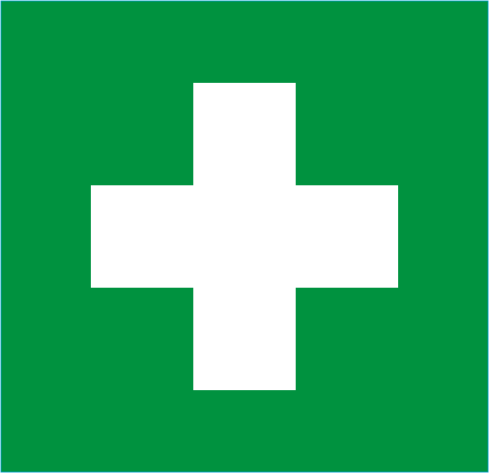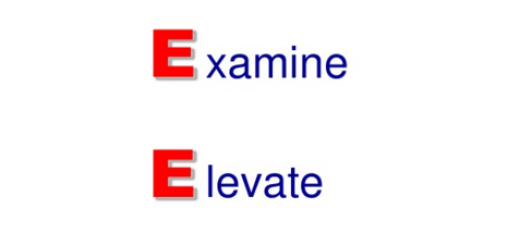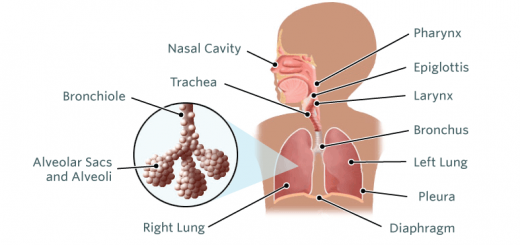What to Do With Expired First Aid Kits: 3 Safe Disposal Steps
Have you ever reached for your first aid kit in a moment of need, only to discover its contents are expired? Yep, expired first-aid supplies are a thing, and using them can be dangerous.
Don’t worry! This article is your guide to navigating the not-so-glamorous world of expired first-aid supplies. We’ll discuss the safe disposal techniques and even explore the consequences of using expired first aid items.
The Consequences of Using Expired First Aid Supplies
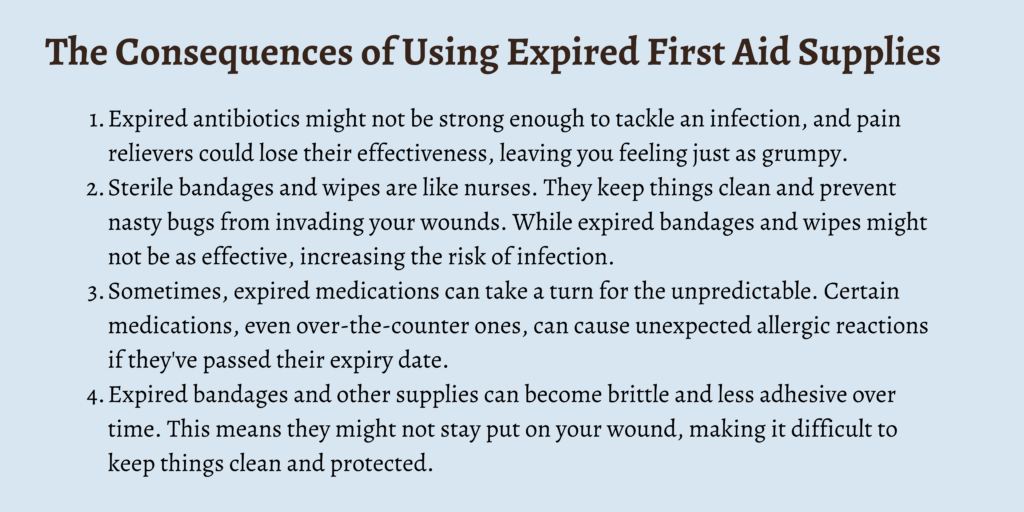
Expired food is a definite “no-go,” but when it comes to our first-aid kits, the consequences of using outdated supplies can be a lot more serious than a grumbling stomach. Let’s know why relying on expired first-aid supplies can be risky:
- Expired antibiotics might not be strong enough to tackle an infection, and pain relievers could lose their effectiveness, leaving you feeling just as grumpy.
- Sterile bandages and wipes are like nurses. They keep things clean and prevent nasty bugs from invading your wounds. While expired bandages and wipes might not be as effective, increasing the risk of infection.
- Sometimes, expired medications can take a turn for the unpredictable. Certain medications, even over-the-counter ones, can cause unexpected allergic reactions if they’ve passed their expiry date.
- Expired bandages and other supplies can become brittle and less adhesive over time. This means they might not stay put on your wound, making it difficult to keep things clean and protected.
Identifying Expired Supplies in Your First Aid Kit
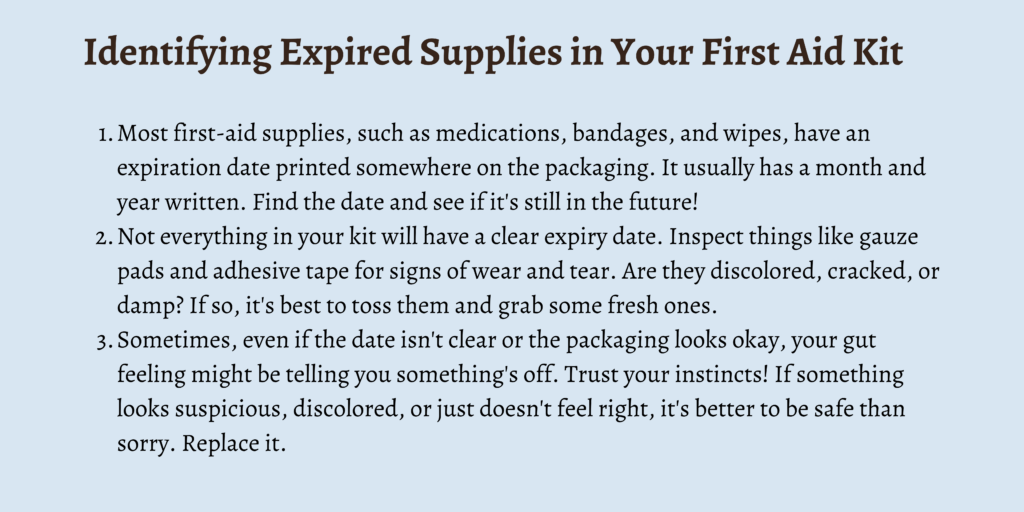
So, how do we turn ourselves into expiry-date investigators and sniff out the outdated supplies in our first-aid kits? Learn how to identify expired items:
- Most first-aid supplies, such as medications, bandages, and wipes, have an expiration date printed somewhere on the packaging. It usually has a month and year written. Find the date and see if it’s still in the future!
- Not everything in your kit will have a clear expiry date. Inspect things like gauze pads and adhesive tape for signs of wear and tear. Are they discolored, cracked, or damp? If so, it’s best to toss them and grab some fresh ones.
- Sometimes, even if the date isn’t clear or the packaging looks okay, your gut feeling might be telling you something’s off. Trust your instincts! If something looks suspicious, discolored, or just doesn’t feel right, it’s better to be safe than sorry. Replace it.
Regularly check the expiration dates of first aid supplies.
3 Safe Disposal Methods for Expired First Aid Supplies
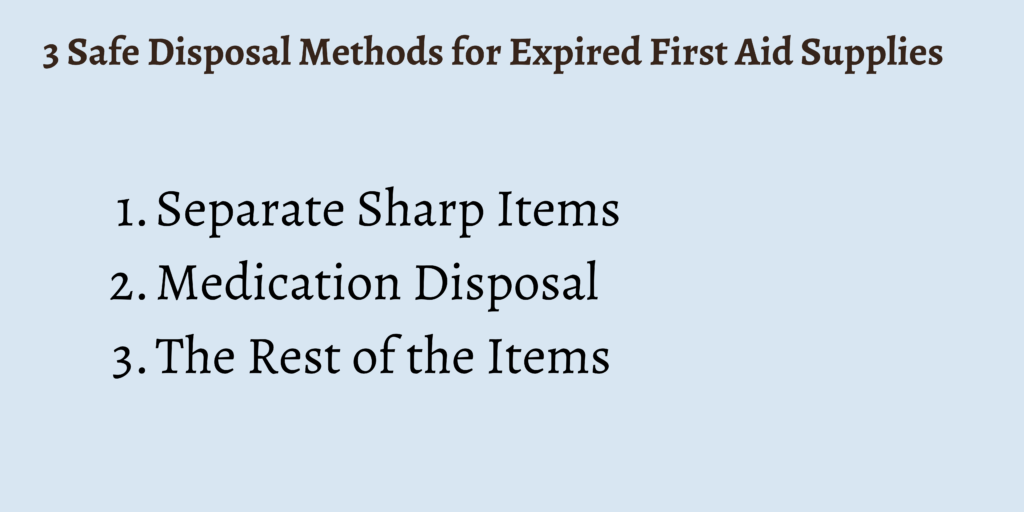
So, you’ve identified the expired products in your first-aid kit. Now what? Just tossing them in the regular trash isn’t the best solution. Know how to dispose of them safely and responsibly:
Separate Sharp Items
Used needles, syringes, and lancets are considered sharps waste and require special attention. Don’t throw them in with your regular trash! Instead, invest in a designated sharps container.
These sturdy, puncture-resistant containers are specifically designed for safe disposal of these items. Once the container is full, you can usually take it to a designated sharps disposal facility, often located at pharmacies or hospitals.
Medication Disposal
Expired medications are another category that needs special handling. Flushing them down the toilet might seem convenient, but it can actually pollute our water supply. There are several other safe disposal options:
- Take-Back Programs: Many pharmacies offer medication take-back programs. These programs allow you to safely drop off your expired medications, no questions asked. Just do a quick online search to see if there’s a take-back program near you.
- Mail-In Disposal: Some companies offer mail-in disposal options for expired medications. They provide you with pre-paid envelopes specifically designed for safe medication disposal. Check with your local pharmacy or healthcare provider for details.
- Household Hazardous Waste Events: Many communities hold periodic household hazardous waste collection events where you can safely dispose of expired medications and other hazardous materials. Keep an eye out for announcements in your local paper or online community forums.
The Rest of the Items
For non-hazardous expired supplies like bandages, wipes, and gauze pads, disposal is a bit simpler. Double-bag them in sealed plastic bags to prevent leakage and toss them in your regular trash. However, always check your local regulations for any specific guidelines on disposing of medical waste.
Building a New First-Aid Kit
You’ve disposed of the expired products and are ready to breathe new life into your first-aid kit. But where do you start?
Here’s a guide to restocking your kit with the essential supplies for everyday emergencies:
- Before you hit the store, grab a pen and paper and create a first-aid kit checklist. This will help you stay focused and ensure you’re not forgetting anything crucial. There are plenty of pre-made checklists online. Feel free to customize it to your specific needs and emergencies.
- Some must-have items for your first-aid kit:
- Wound Care: Adhesive bandages in various sizes, gauze pads, antiseptic wipes, and non-stick sterile dressings.
- Pain Relief: Over-the-counter pain relievers like acetaminophen or ibuprofen can help manage headaches, muscle aches, and fever.
- Ointments: Remember to include soothing ointments, such as antibiotic ointment for minor cuts and scrapes and hydrocortisone cream for insect bites and rashes.
- Calming Products: Tweezers for splinter removal, a thermometer for checking temperatures, and instant cold compresses for bumps and bruises are all helpful additions.
- Beyond the Basics: Depending on your lifestyle and risks, you might want to consider adding some extra supplies:
- Allergy: If you or someone in your household has allergies, consider including antihistamines and an EpiPen (if prescribed by a doctor).
- Sun Safety: Sunscreen and insect repellent are essential for any outdoor enthusiasts.
- Emergency Essentials: For more serious situations, consider adding a CPR mask, emergency blanket, and emergency contact information to your kit.
Shop Smart, Stock Smart: When shopping for supplies, choose reputable brands and pharmacies. Stick to the recommended dosages on medications and pay attention to expiry dates!
FAQs
Can I throw away expired first-aid supplies in the regular trash?
Not all expired supplies can go in the trash. Sharps like needles require a sharps container, and medications have special take-back programs or mail-in disposal options.
How often should I check my first-aid kit?
Make it a habit to inspect your kit at least once a year. This helps ensure everything is still within expiry and in good condition.
What are some essential supplies for a first-aid kit?
Bandages, antiseptic wipes, pain relievers, and ointments are must-haves. For additional needs, consider adding tweezers, a thermometer, and cold compresses.
Is it okay to donate unused, unexpired supplies from my old kit?
Absolutely! Check with local charities or organizations that might accept unopened, non-expired first-aid supplies. This gives your old kit a second life and helps those in need.
Conclusion
Using expired items can be hazardous and cause health issues.
Remember, properly disposing of expired supplies and restocking with essentials is a small investment that can make a big difference when you need it most. So, go forth and conquer those bumps and scrapes with confidence!

